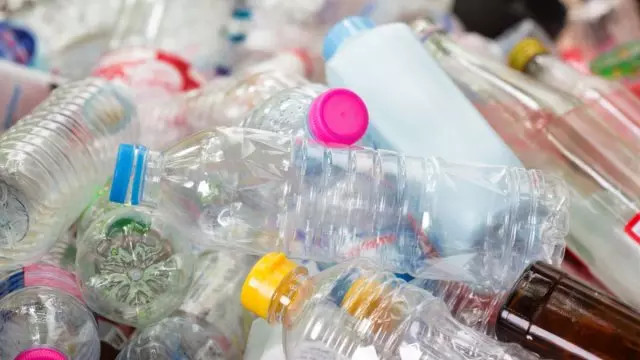
Can plastic be usefully addressed as a man-made extension of the carbon life cycle? The University of Surrey’s Dr Noreen O’Meara argues that learning the right lessons from COP26 requires a more contextualised view of the problems of a fossil-fueled economy and a better understanding of what recycling can and cannot do to help solve them.
Plastic products are essential to modern life for many purposes – such as medicine and healthcare. Yet, non-essential single-use plastics are hallmarks of modern life too. When you study the problems caused by plastics waste accumulating in the environment, it becomes instinctive to view a single-use plastic bottle as the ultimate symbol of our throwaway society. At the start of COP26, did the UK Prime Minister see it the same way?
The recyclability illusion
Responding in a Q&A session with children just before COP26, Boris Johnson observed that recycling plastics “doesn’t begin to address the problem”. His observation triggered accusations that the Prime Minister had “completely lost the plastic plot”, contradicting government policy, and undermining efforts made to encourage people to take recycling seriously. His instinct that recycling alone is not a solution was sound.
The assumption that plastics are universally recyclable is still a pervasive narrative. Many products are designed in ways which mean they cannot be recycled. It is troubling that in countries where plastics regulations are light-touch, major retailers flood the markets with packaging and sachets that are virtually impossible to recycle. Countries aiming to partially trade their way out of the problem – the UK ships around 200,000 tonnes of plastics abroad a year – add to this burden of waste in countries with insufficient capacity to deal with it. The destinies of unrecyclable plastics are harmful: slowly degrading in rivers and oceans, polluting the air after incineration, or discarded in landfills, leaching methane – an even more potent greenhouse gas than carbon.

Treat plastics as carbon
Inventing plastics created a new, prolific, man-made extension to the carbon lifecycle. Tackling carbon encompasses the need to tackle plastics waste. With global levels of plastics production and consumption rising, plastics pollution should be viewed from various law and policy angles, taking full account of the plastics value chain. Enhanced governance tackling plastics pollution is central to this at national, regional, and potentially international levels. The case for a global treaty tackling plastics pollution is strengthened by the outcome of COP26. The continued gap between pledges to decarbonise and the goal of preventing warming above 1.5 degrees remains too great not to scrutinise all aspects of the fossil-fuel economy.
Part of the long-term solution to plastics waste pollution therefore echoes a demand which is essential if governments can deliver on their net-zero ambitions: keep carbon in the ground. The main narrative at COP26 was about tackling carbon emissions, just as the mainstream narrative on plastics pollution focuses on blaming the public and promoting recycling as a solution. In both contexts, focusing too narrowly on the emissions and on blame for waste generated misses major opportunities to make the most impactful changes.
Dr Noreen O’Meara is a Senior Lecturer in Human Rights and European Law and Co-Director of the Surrey Centre for International and Environmental Law

Such an interesting analysis while stating the issue as is: plastics (life cycle) are a part of the carbon life cycle.
The net-zero economy can not be possible with plastics — then why COP 26 was silent on a plastic-free economy?
During COP26 there has been something of an attitude that plastics are a sideshow to the ‘real’ issue of climate change. But the production of plastics and the impact of their lifecycle are as much part of the problem as other sources of carbon. Plastics truly are a multifaceted complex problem – a wicked problem.